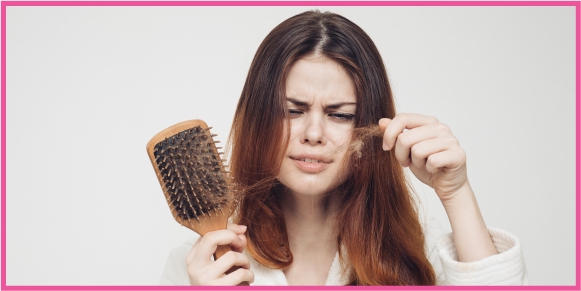Articles
Worried over post-Covid hair loss?
People who have recovered from COVID-19 have experienced massive hair loss. Experts say this has emerged as one of the most frequently reported syndromes in patients recovering from Covid-19.
Patients who have recovered from COVID-19 are observing an increased level of hair loss. Unless you abnormally lose your hair, hair loss is not usually anything to be concerned about. For some COVID-19 patients, hair loss was mild, whereas for others it was severe.
COVID-19 causes two types of hair loss: Telogen Effluvium and Alopecia Areata. The first is a temporary loss of hair, while the second is a loss of hair that is unpredictable.
What is Telogen Effluvium ?
Telogen effluvium is a form of temporary hair loss that usually happens after stress, a shock, or a traumatic event and nowadays especially after Covid-19.
In a person with telogen effluvium, somebody change or shock pushes more hairs into the telogen phase. Typically in this condition, about 30% of the hairs stop growing and go into the resting phase before falling out. So if you have telogen effluvium, you may lose an average of 300 hairs a day instead of 100.
Large amounts of a person’s hair might fall out, but it is often temporary, and the hair usually grows back.
What to do?
Even though hair loss due to stress is just temporary, it can be stressful. In terms of nutrition, doctors recommend iron-rich foods and vitamin D-rich foods. Further, hair loss supplements can help restore hair health, reducing hair fall.
What can you do to combat hair shedding?
People should approach a doctor only if excessive hair loss persists even after consuming a nutritious diet for five to six weeks. Haircare solutions that are commonly used to prevent excessive hair loss include: washing the hair with paraben and sulfate-free shampoo, taking care to prevent itchy, flaky scalps, avoiding scalp massages and oils, using a wide-tooth comb, and seeking immediate medical intervention in case of development of bald patches and huge volume of hair fall.
The doctors advised people to avoid stress, meditate, eat healthily, take natural nutritional supplements, avoid heat and chemicals for hairstyling, and refrain from following a sedentary lifestyle.
Here are tips to try to reduce post-covid-19 hair fall.
· Eat plenty of colors in your diet / Rainbow diet
By ensuring you’re eating a few colored fruits or vegetables at each meal, you’re setting yourself up for good health. To try eating the rainbow, work toward adding at least two or three colored fruits or vegetables to each meal and at least one or two to each snack.
· Exercise regularly
Exercise can help hair grow because it increases blood flow and circulation throughout the body. An increase in blood flow means that more nutrients and oxygen are reaching the scalp. People can help nourish their hair follicles by performing 30 minutes of cardiovascular exercise at least three times per week.
· Sleep well
Sound asleep at night promotes protein synthesis in the hair, as well as releasing growth hormones that are very beneficial for the health of your hair overall. It is believed that melatonin regulates the body’s sleep cycle and increases hair growth.
· Reduce mental stress
You can practice breathing exercises or meditation to tackle stress.
Yes, stress and hair loss can be related. Three types of hair loss that can be associated with high-stress levels are Telogen effluvium. In telogen effluvium (TEL-o-jun uh-FLOO-vee-um), significant stress pushes large numbers of hair follicles into a resting phase.
· Seek help from a Dermatologist
It’s best to make an appointment to see a dermatologist If you are not able to handle the hair fall. Dermatologists are the experts in diagnosing and treating hair loss. A dermatologist can tell you whether it’s FPHR or something else that is causing your hair loss. Other causes of hair loss can look like FPHL, so it’s important to rule out these causes.
Hair loss related to the coronavirus is generally temporary. Affected follicles typically return to their natural growth cycle over several weeks to months. Thankfully, COVID-19 hair-loss treatments are available.



Good
Good
Good
Good